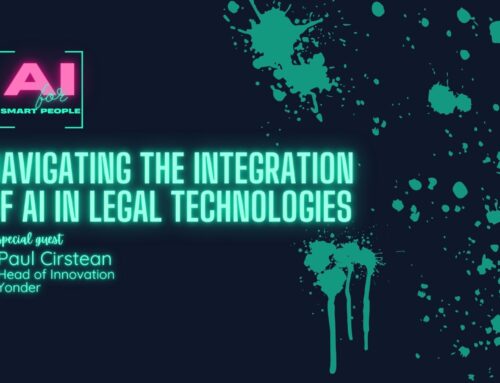What are Law Firms REALLY Saying About AI? A Peek Behind the Curtain
Featuring
Nicola Shaver, Legal Tech Hub
In the latest episode, Cheryl Wilson Griffin sits down with Nikki Shaver, CEO and founder of Legal Technology Hub, who shared a preview of their recent survey on law firms’ attitudes and usage of AI.
AI Adoption in Law Firms
Nikki Shaver shared findings from a comprehensive survey conducted by Legal Technology Hub. The survey covered law firms from the US, UK, Canada, and Australia. It revealed significant differences in AI adoption between regions. US firms, driven by tools like CoCounsel, showed a high level of leadership support and quick adoption. In contrast, UK firms demonstrated more skepticism and slower uptake, possibly due to stricter data privacy regulations like GDPR.
The Role of Generative AI
Generative AI has emerged as a game-changer in legal technology. However, its application in legal research is limited due to potential inaccuracies. Instead, firms find it more valuable for summarization, data normalization, and operational tasks. These use cases demonstrate how AI can save time and improve efficiency without compromising accuracy.
Build vs. Buy Debate
The conversation also touched on the build versus buy debate. Many firms prefer leveraging APIs and secure sandboxes to integrate AI, rather than building models from scratch. This approach allows for safer and more effective deployment of AI technologies. Additionally, firms are starting to use retrieval-augmented generation (RAG) to improve accuracy and reduce hallucinations.
Knowledge Management and AI
AI’s rise has breathed new life into knowledge management (KM). Contrary to predictions that KM might be obsolete, AI has made it more crucial than ever. Law firms are using AI to manage and normalize data, creating a new type of precedent document. These documents involve complex prompts that optimize AI outputs, highlighting the need for continued KM efforts.
Training and Education
Nikki Shaver stressed the importance of ongoing education in AI and prompt engineering. Firms need to train their lawyers and staff to use AI tools effectively. Understanding how to structure prompts and use AI tools can significantly enhance productivity and accuracy. This continuous learning process is essential for staying ahead in the rapidly evolving AI landscape.
Future of Legal Technology
Looking ahead, the discussion highlighted the need for firms to reevaluate their technology stacks. As AI capabilities expand, firms must ensure their tools are up-to-date and effective. This includes considering new AI enhancements and evaluating the return on investment. Firms that fail to keep up with these advancements risk falling behind.
Conclusion
The episode of “AI for Smart People” with Cheryl Wilson Griffin and Nikki Shaver provided valuable insights into the current and future state of AI in the legal industry. From understanding AI’s potential to adopting new technologies and training staff, law firms must stay proactive. Embracing AI can transform legal practice, making work smarter, not harder.
In conclusion, the legal industry stands on the brink of a significant transformation driven by AI. As firms navigate this new landscape, continuous learning and strategic adoption of AI technologies will be crucial. The future of legal practice lies in harnessing the power of AI to improve efficiency, accuracy, and overall service delivery.



